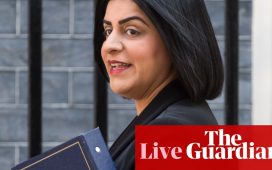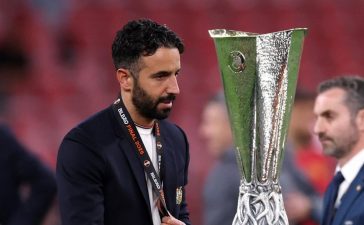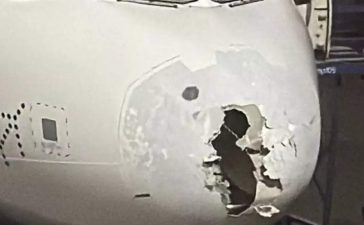The prosecutor for the international criminal court (ICC) has said the world needs to “have the stamina” to enforce international law by trying those accused of war crimes in Ukraine, four days after the court took action against Vladimir Putin.
Karim Khan also challenged the Kremlin to allow Ukrainian children abducted to Russia to return home, after his court issued an arrest warrant for Putin and Russia’s children’s commissioner, Maria Lvova-Belova, on the grounds that they had overseen the forcible transfer of thousands of children.
“This is a moment of crisis,” Khan said. “I don’t think that is hyperbole … we need to have the stamina to deliver on justice.”
Russia mounted a symbolic prosecution of its own against the ICC on Monday, and the former Russian president turned anti-western hawk Dmitry Medvedev threatened to target The Hague, where the court is based, with nuclear missiles, telling judges to look carefully at the sky.
Speaking in London, Khan said it was a sombre moment that for the first time the leader of a country that was a permanent member of the UN security council was being charged with war crimes.
Alongside Khan, Ukraine’s justice minister, Denys Maliuska, and its prosecutor general, Andriy Kostin, continued to demand that the world press ahead with charging Putin and his allies with the crime of aggression – a leadership crime based on the premise that Russia had launched an attack on Ukraine not in self-defence and without authorisation by the UN security council.
The ICC, it is argued, does not have powers to prosecute Russia for the crime of aggression since Russia is not a signatory to the Rome statute that set up the court. But Khan sidestepped that argument in favour of spelling out what he believed was at stake for international law and the world in Ukraine.
“This moment of reawakening has some promise within it,” he said. “That finally we can vindicate the suffering of the Holocaust, of the Balkans, Rwanda, Sierra Leone and Cambodia that we will have a world for our children of ‘never again’.”
The Chinese president, Xi Jinping, flew into Moscow on Monday, the first national leader to shake Putin’s hand since the warrant was issued, with Beijing saying the warrant reflected double standards on the ICC’s behalf.
Defending himself from the charge of double standards or western hypocrisy, Khan said: “What we oppose are actions that have been deemed criminal since Nuremberg … we don’t just whisper pious nothings, but we show those who need it most that the law provides shelter when even their own shelter is decimated under bombs that cause massive devastation.
“It is not a moment for backslapping. It is a very sad and sombre occasion that for the first time ever judges of the international criminal court have felt it necessary to issue a warrant against a leader and senior state officials of a permanent member of the UN security council.”
Khan said “apolitical evidence-led investigation is the hallmark of my office and the absolute indispensable element of any judicial process that stands the test of time”. He laid down a challenge to the Russian president, saying that “to anyone who says what has seemed to have taken place was a humanitarian evacuation, the evidence will tell a different story, and the judges have said so”.
Moscow rejects the ICC charges, calling the move unacceptable and saying it has no legal force in Russia. Russia has not concealed the programme under which it has brought thousands of Ukrainian children to Russia, but presents it as a humanitarian campaign to protect orphans and children abandoned in the conflict zone.
In a message to Putin, Khan said: “I say repatriate the children, return the children, reunite the children. If there is any semblance of truth to the utterances that this is for the sake of the children instead of giving them a foreign passport, return them to the countries of their nationality.”
Urging his audience of as many as 40 mainly western justice ministers to realise what was at stake, he said: “If we don’t in this moment in world affairs cling to the law, we will not only miss an opportunity, we may not have further opportunities. This needs to be a moment when we realise if we do not cling to the law we may have nothing to cling to in the future. We cannot be complacent that peace and prosperity and economic opportunity is the inevitable birthright of every child.”










